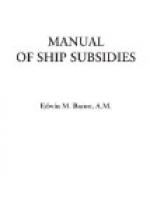Their original objects when first applied to steamship service, as defined by a Parliamentary committee in 1853, were—“to afford us rapid, frequent, and punctual communications with distant ports which feed the main arteries of British commerce, and with the most important of our foreign possessions; to foster maritime enterprise; and to encourage the production of a superior class of vessels, which would promote the convenience and wealth of the country in time of peace, and assist in defending its shores against hostile aggression.” To foster British commerce they have undeniably been employed to meet and check foreign competition on the seas, as the record shows.
In the United States they have taken the form of postal subsidies openly granted for the two-fold purpose of the transportation of the ocean mails in American-built and American-owned ships, and the encouragement of American shipbuilding and ship-using.
CHAPTER II
GREAT BRITAIN
England has never granted general ship-construction or navigation bounties except in the reigns of Elizabeth and James I. Under Elizabeth Parliament offered a bounty of five shillings per ton to every ship above one hundred tons burden; and under James I that law was revived, with the bounty applying only to vessels of two hundred tons or over.[A]
A policy of Government favoritism to shipping, however, began far back in the dim ninth century with Alfred the Great. Under the inspiration of this Saxon of many virtues, his people increased the number of English merchant vessels and laid the foundation for the creation and maintenance of a royal navy.[B] The Saxon Athelstan, Alfred’s grandson, whose attention to commerce was also marked, first made it a way to honor, one of his laws enacting that a merchant or mariner successfully accomplishing three voyages on the high seas with a ship and a cargo of his own should be advanced to the dignity of a thane (baron).[C]
The first navigation law was enacted in the year 1381, fifth of Richard II. This act, introduced “to awaken industry and increase the wealth of the inhabitants and extend their influence,"[D] ordained that “none of the King’s liege people should from henceforth ship any merchandise in going out or coming within the realm of England but only in the ships of the King’s liegeance, on penalty of forfeiture of vessel and cargo."[E]
This act of Richard II was the forerunner of the code of Cromwell, which came to be called the “Great Maritime Charter of England,” and the fundamental principles of which held up to the second quarter of the nineteenth century.
Under Charles I was enacted (1646) the first restrictive act with relation to the commerce of the colonies, which ordained “That none in any of the ports of the plantations of Virginia, Bermuda, Barbados, and other places of America, shall suffer any ship or vessel to lade any goods of the growth of the plantations and carry them to foreign ports except in English bottoms,” under forfeiture of certain exemptions from customs.[F] It was followed up four years later (1650) under the Commonwealth, by an act prohibiting “all foreign vessels whatever from lading with the plantations of America without having obtained a license."[G]




